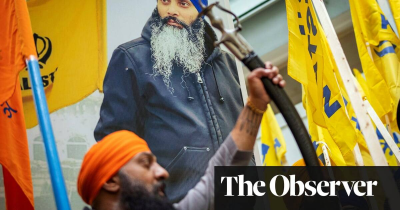The Guardian - Editorial-The Observer view on assassination of Sikh in Canada Narendra Modis hubris is ill-judged Observer editorial
September 24, 2023 3 min 616 words
这篇观点来自《观察家报》,探讨了印度总理纳伦德拉·莫迪对加拿大锡克活动家哈德普·辛格·尼杰的杀害问题。文章指出,尽管哈德普·辛格·尼杰并非高调人物,但他的死亡仍然被视为政治暗杀,因为他是印度旨在反对的锡克故乡卡利斯坦运动的倡导者。 加拿大总理贾斯汀·特鲁多公开表示,有“可信的理由”相信印度政府的特工与这一谋杀案有关,尽管他没有提供证据。文章认为,特鲁多在加拿大国会正式场合下发表这一言论,必然有充分理由。此外,文章提到五眼联盟可能向特鲁多提供了指向印度官员和外交官在加拿大的涉案信息,这是印度涉及境外杀人案件的不是第一次。 文章还批评了莫迪政府的反应,认为他的高傲和缺乏迅速应对的智慧导致了外交危机的升级,包括驱逐一名加拿大外交官、暂停签证服务和贸易谈判。这一反应被视为傲慢和愚蠢。文章认为,莫迪政府的行为引发了对其对民主的承诺以及印度作为伙伴的可靠性的质疑。哈德普·辛格·尼杰的暗杀和沙特异见者贾马尔·卡舒吉的暗杀都留下了令人难以忘怀的血腥印记。 总的来说,这篇评论批评了莫迪政府对外交危机的处理方式,以及对印度民主和国际声誉的负面影响。它强调了印度在国际舞台上的角色和责任,同时对特鲁多政府的立场提出了一些理解。
Political assassination is a practice as old as human society, although the term itself derives from the 12th-century Persian Order of Assassins, first described by Marco Polo. Julius Caesar, Thomas Becket, Archduke Franz Ferdinand, Leon Trotsky, John F Kennedy, Lord Louis Mountbatten, Olof Palme and Yevgeny Prigozhin were victims of notorious political assassinations. They had one thing in common: all were high-profile targets.
That is not a description that may be accurately applied to Hardeep Singh Nijjar, a Canadian citizen shot dead in June by two masked gunmen outside a Sikh temple in British Columbia. If Nijjar had any claim to fame, it was as a campaigner for Khalistan, a notional Sikh homeland in the Indian Punjab fiercely opposed by India’s government. His activism provides the only plausible motive for his murder. Little-known though he was, Nijjar’s death was a political assassination, too.
After failing to obtain a private explanation, Justin Trudeau, Canada’s prime minister, went public last week, declaring that there were “credible reasons” to believe agents of the Indian government were behind the murder. His statement was immediately rejected by Delhi, which called the allegation “absurd”. That was a poor choice of word. A moment’s reflection should have told the prime minister, Narendra Modi, that it’s a very serious matter indeed.
Although Trudeau did not provide evidence for his claim, he would not have made it, in the formal setting of the Canadian parliament, unless he had firm grounds for believing it to be true. It has emerged that the Five Eyes intelligence-sharing network – comprising the US, UK, Canada, Australia and New Zealand – may have provided Ottawa with incriminating information that allegedly points to the complicity of Indian officials and diplomats in Canada. If so, it would not be the first time India has been implicated in extra-territorial killings.
A less haughty, quicker-thinking figure than Modi would also have understood that Nijjar’s murder, appalling in itself, raised significant matters of state that Trudeau could not ignore. “Any involvement of a foreign government in the killing of a Canadian citizen on Canadian soil is an unacceptable violation of our sovereignty,” Trudeau said. After the poisonings by Russian agents in Salisbury, Britain knows how that feels.
Public expressions of concern by the US and UK governments were followed up in person when Joe Biden and other western leaders met Modi at the recent G20 summit in Delhi. This, too, should have persuaded Modi that, whatever the truth of the matter, he faced a damaging diplomatic row. Yet, unwisely, he escalated, expelling a Canadian diplomat and suspending visa services and trade talks. At this point, it is unclear where righteous indignation ends and purblind arrogance begins.
It’s true, as Indian critics say, that Trudeau faces domestic political complications. Canada’s sizeable Sikh minority wields significant influence. It’s also true that India has long regarded the Khalistan movement as a destabilising separatist force supported by terrorism. Yet Modi, an authoritarian populist who tends to treat any opposition as a betrayal akin to treason, faces political complications of his own, principally a general election next year. Confronting Canada, a fellow Commonwealth country associated by some with the British imperial era, serves his Hindu ultra-nationalist agenda.
India is a rising power on the global stage that ostensibly shares western values. Britain and the US view it as an important ally in the wider contest with China. But the Modi government’s behaviour at home and abroad raise doubts about its commitment to democracy and India’s reliability as a partner. Nijjar’s assassination, like that of the Saudi dissident, Jamal Khashoggi, leaves a bloody stain that will be hard to wash away.

